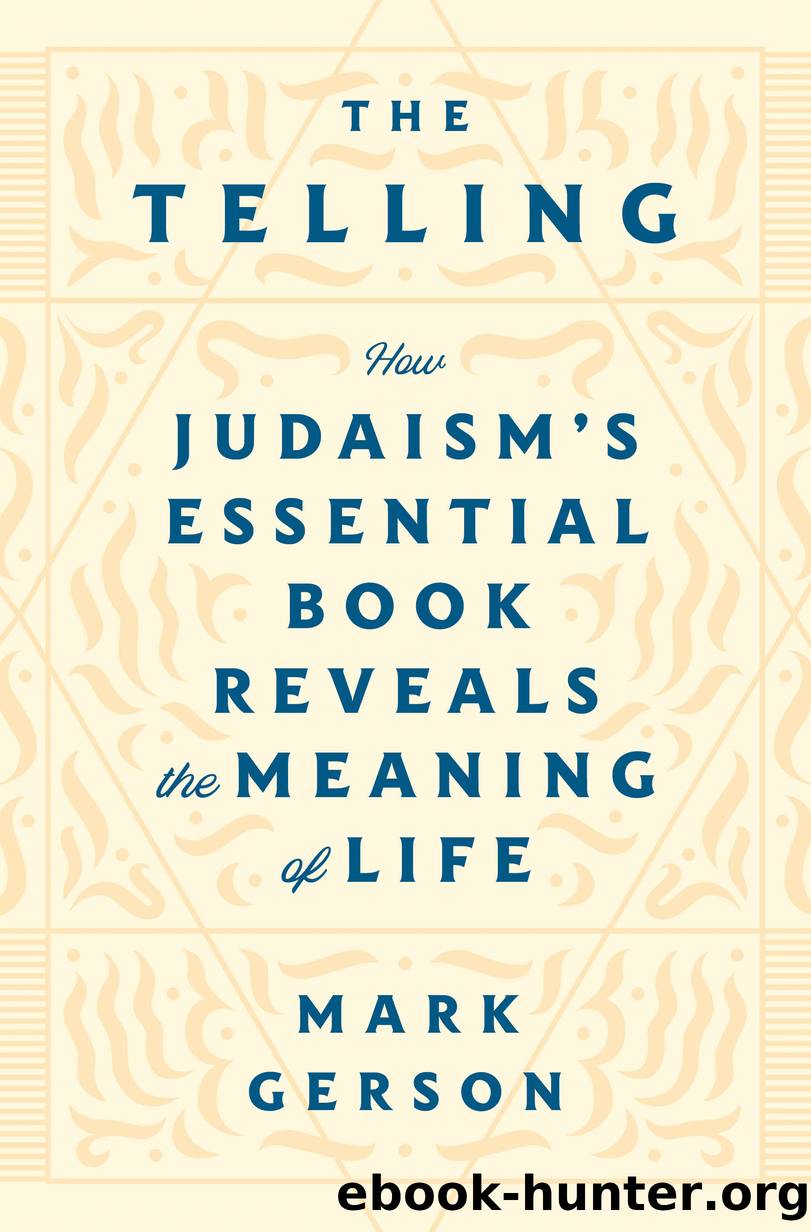The Telling by Mark Gerson

Author:Mark Gerson
Language: eng
Format: epub
Publisher: St. Martin's Publishing Group
FINDING THE IMAGE OF GOD (ITâS NOT HARD)
Originally, our ancestors were idol worshippers.
We started telling the story by referring to our origin as slaves. Here is where we begin again, referencing our origin as idol worshippers. Seder-goers may ordinarily go quickly through this section of the Haggadah because of how we conceive of idolatry. We might associate idol worship with praying before graven objects, and take comfort in that we donât do that. We might think that we are over idolatry.
There are two problems with that.
First, idolatry is the most frequently prohibited activity in the Torah. The Talmud says that the denial of idolatry is akin to accepting the entire Torahâa belief echoed by Maimonides, who writes, âWhosoever denies idolatry admits the whole Torah, all of the prophets and all in that which the prophets were instructed since Adam even till the end of time. Thus it is the most outstanding commandment of them all.â1 Since the Torah is our eternal guidebook, the most frequently prohibited activityâthe one practice considered akin to accepting the whole of itâmust still be relevant.
Second, the Haggadah says that originally our ancestors were idol worshippers but now God has âbrought us nearer to His service.â âNearerâ is a tantalizing word. It clearly suggests that we are not there yet. It seems, then, that there is a continuum from idolatry to service to God. We might be ânearerâ to God than our idol worshipping ancestors were, but how much closer? The Haggadah does not say.
If idolatry is a persistent problem and is not a matter of worshipping wooden icons, what is it? It is defined, perhaps best, in the Second Commandment: âThou shalt have no other gods before me.â A created icon is only one kind of god a person can place before God. If serving God is the ultimate end that all other rules and goals serve, then any other ultimate goalâanything âbefore meââis an idol.
An idol can therefore be recognition or money, social approval or physical beauty, bodily pleasure or even, as weâll see, oneâs Judaism. This does not suggest that everything beautiful is an idol. The same thing can be, depending on how it is considered and used, a holy object or an idol. One can love making money in order to alleviate the suffering of Godâs most vulnerable children. Another can love making money to accumulate the stuff that it can buy. The same thing can, depending on the perspective and use of the person controlling it, be idolatrous or sacred.
Even if we can identify idolatry, a fundamental question remains: What is so bad about it? There are a lot of ways to reject God. There are atheism and agnosticism, but neither is even mentioned in the Torah or the Haggadah. What is it about idolatry that makes it uniquely condemned?
There are at least two possibilities. We have discussed that we banish chametz on Pesach to focus on permanent things. One of the great teachings of Judaism is that the genuinely permanent things are invisible.
Download
This site does not store any files on its server. We only index and link to content provided by other sites. Please contact the content providers to delete copyright contents if any and email us, we'll remove relevant links or contents immediately.
The Power of Habit by Charles Duhigg(3114)
Man's Search for Meaning by Viktor E. Frankl(2658)
Mckeown, Greg - Essentialism: The Disciplined Pursuit of Less by Mckeown Greg(2411)
MOSES THE EGYPTIAN by Jan Assmann(2402)
Devil, The by Almond Philip C(2317)
The Complete Dead Sea Scrolls in English (7th Edition) (Penguin Classics) by Geza Vermes(2267)
Unbound by Arlene Stein(2256)
I Capture the Castle by Dodie Smith(2024)
Schindler's Ark by Thomas Keneally(1864)
The Invisible Wall by Harry Bernstein(1794)
The Gnostic Gospel of St. Thomas by Tau Malachi(1777)
The Bible Doesn't Say That by Dr. Joel M. Hoffman(1673)
The Secret Doctrine of the Kabbalah by Leonora Leet(1600)
Political Theology by Carl Schmitt(1567)
The Jewish State by Theodor Herzl(1525)
A History of the Jews by Max I. Dimont(1512)
The Dead Sea Scrolls Bible by Martin G. Abegg(1500)
The Book of Separation by Tova Mirvis(1477)
Oy!: The Ultimate Book of Jewish Jokes by David Minkoff(1359)
